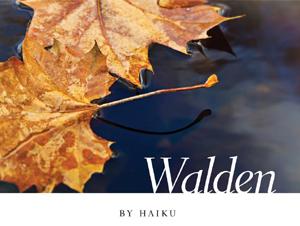‘Walden by Haiku’
This story is adapted from a broadcast audio segment; use audio player to listen to story in its entirety.
Henry David Thoreau’s “Walden,” published in 1854, is an acknowledged classic of American literature and one many of us probably know well. Thoreau’s prose include images of nature, an emphasis on simplicity, a sense of aloneness and the use of paradox. As it happens, these elements are also present in Japanese haiku poetry.
Noting these similarities, Penn State/Altoona Professor Ian Marshall took Thoreau’s prose and rewrote it into a series of haiku. He assembled them in a book entitled, “Walden by Haiku.”
Here’s a sample of a “Walden” haiku:
The first sparrow
Faint silvery warblings
Over bare fields.
Marshall says “Walden” and haiku share “the aesthetic of simplicity” of language and theme.
“There’s a reliance on images of nature as Thoreau goes through ‘Walden.’ It’s more and more focused on images of nature with less and less philosophical explanation,” Marshall explains. “There’s a view of nature as a realm of the unchanging and the ever changing, focusing on what’s eternal in the natural world but also what’s ephemeral, that’s large scale and small scale. So there’s a whole set of aesthetic principles of haiku that seem to be demonstrated unintentionally, of course, on Thoreau’s part in ‘Walden.'”
Thoreau never read a haiku, as there were no English translations of the poetry in his time. And yet, he arrived at a similar approach to writing about nature, and how he and we relate to nature. It starts with the richness of simplicity.
“To live a simple life is, paradoxically, a very rich kind of life, and a haiku specializes in that kind of paradox: to look at simple things that are meaningful,” said Marshall. “This is a principle called ‘wabi,’ and the idea is that in material poverty — life without fancy things — there’s a kind of spiritual richness. I think Thoreau sensed that, living there by the side of Walden Pond. I think writers of haiku sense the same thing.”
This principle of simplifying, or “wabi” in Japanese, is a notion that Thoreau explored in ‘Economy,’ the first chapter of “Walden.” He wrote: “Shall we always study to obtain more of these things and not sometimes to be content with less?”
“Haiku is all about being content with less, because it’s so few words and it’s so short, and so small, and so simple, and yet there’s something magnificent about those few simple words,” said Marshall.
Marshall extracted this haiku from the ‘Economy’ section of “Walden”:
No curtains
No gazers to shut out
But the sun and the moon.
The notion of solitude is also inherent in haiku. The Japanese term is “sabi.”
Marshall says it’s another element that haiku and “Walden” have in common. “Thoreau has a chapter called ‘Solitude’ and in the Japanese principle, it’s sometimes translated as aloneness. And there’s something melancholy about that, but there’s also something beautiful because it’s in moments when we’re alone in a natural world that we may most be attuned to the beauty of the natural world.”
Marshall also found parallels between what Thoreau was doing at Walden and what a Japanese haiku master, Basho, did at a pond a century earlier.
“Basho was probably the most famous haiku writer of all, perhaps the most famous writer in Japanese literature. And interestingly enough probably his most famous haiku is about a pond, and of course ‘Walden’ is about Thoreau living by the side of a pond.”
“The point for Basho was — among many possible points — is that this is the moment when he realized haiku doesn’t have to be about the spectacular, it doesn’t have to be about a magnificent mountain vista or a waterfall. It can be something as simple as an old pond and a frog jumping. And in that simplicity, in that attunement to taking in the simplicity of the natural world, that’s where the beauty of a haiku comes.”
As for how Thoreau might feel about his prose being turned into haikus, Marshall thinks the writer would have understood the reasoning behind it.
“I hope he would be pleased that someone was so interested in what he had to say that they wanted to dwell on his words to this extent, to shape it into a different literary form. But, I imagine he would have been sympathetic to the goals of haiku and to the practice of haiku. People often say that his poetry wasn’t as wonderful as his prose. If he’d had access to haiku, if he’d known about haiku maybe that would have been his poetic genre.”
Hosted by Steve Curwood, “Living on Earth” is an award-winning environmental news program that delves into the leading issues affecting the world we inhabit. More “Living on Earth.”
